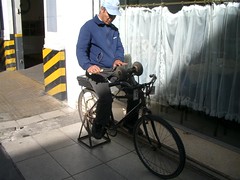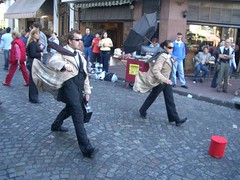27. A guide to teaching in Buenos Aires (B.A, Argentina)
There seems to be a lot of work for native speaking English teachers in Buenos Aires. The easiest work to find is in-company business English classes, through a number of English institutes. Bridge-Linguatec, Brooklyn Bridge, Anglo American Business, MB Language Center, Sol Vasquez and English Training Systems are some of institutes I've contacted. Just look in the Yellow Pages. Usually the companies have long-term contracts with the institutes to provide teachers. The companies will pay the institutes about $25 pesos an hour for a teacher, $15 pesos will go to you the teacher, and the other $10 pesos the institute pockets.
There are other institutes here which are more like a school, ie. with classrooms etc, generally they pay better but it's harder to get a positition there, as I think they prefer to hire Argentine teachers. I presume the same goes for the many Universities in BA - but I never tried to contact them for work.

Random pic: Bicycle powered knife sharpening service
The material is business English which at the moment means the Market Leader series of resources. These are quite good, thorough, and the Teacher's notes are excellent too. To begin with I was spending hours preparing classes like I was taught to in my CELTA course but now more and more I'm often winging it by just following the teacher's notes, especially for the elementary classes.
Before coming here I'd heard mixed things as to whether or not you need to do an (expensive) TEFL course. My answer is this: because the ratio is only 2:1 or 3:1 I'd say not. It's pretty much possible to just follow the teacher's notes and you'll get by. So you don't need it. BUT, all of the institutes I've worked for require a CELTA certificate, so you'll need it if you want to get a job. I have met some people who are working without a qualification but I think it's a bit harder to find work.
The other issue is whether to work illegally or not. All the institutes I work for require a CUIT number, which means we're working legally. A CUIT number is what contractors have, so technically we're not employed by the institutes but are self-employed, and contracted to the institutes (who have contracts with the companies). To get a CUIT you need a work visa - which I have. It's still a bit of a drag to get - you have to have proof of residence, i.e your address, from say a telephone bill or tenancy contract, or, if you're staying in a hotel like me, you have to go to the Police station and get a Certificate from them. Then you have to go to AFIP, the tax department, and fill out the form and wait in line a few hours.
With your CUIT number you then go to a printer and pay $25 pesos to get 100 facturas (invoices) printed with your name and address on them, which you can use to bill your institute at the end of the month.
So if you don't have a work visa it can be difficult to get the CUIT number. But I've met many teachers here without the CUIT who still get paid - usually by 'borrowing' the CUIT and facturas of another teacher who has them, or of an Argentine friend.
The best time of year to look for work is the start of March, as this is when most companies start courses for the year, which will usually run until November. I'm told there's a bit of a slowdown from November until February for summer.
Post any comments if you have anything to add...
Edit: I forgot to mention the viability of living off these wages. See my blog post 24. Working Man for thoughts on that.
Update:
It seems there is work around for people without teaching qualifications, or without a CUIT number. A friend of mine has found some work for a few institutes, and they don't care that he doesn't have certification or a CUIT number. His pay is about $13 pesos an hour, which is slightly less than what I'll call the legit institutes I work for, which pay $15 pesos per hour. It's kind of ironic though, since one of his classes has over ten students, and he has to find his own material. So for this class he could really use the skills you acquire in a TEFL course. Whereas, with my 2:1 classes and the Market Leader series, you don't really need much teaching skill.






9 Comments:
Wow that was informative. Can't wait to hear what topic you tackle next.
By Anonymous, at 9:20 am
Anonymous, at 9:20 am
Yeah, well the About section of this blog says it might be of interest to would-be teachers so I thought I'd better put in something to live up to that.
By mattyboy, at 5:50 am
mattyboy, at 5:50 am
I don't know if you need a suit, I bought one with me from Australia but that was a mistake since you can buy them really cheap and good quality in BA.
I would say you need dress pants and a shirt and shoes and maybe tie if you want to get a job, but suit, probably not.
Then again, I know people who found work without any of the above. Depends on the institute you're interviewing for, some are more professional than others.
By mattyboy, at 9:27 am
mattyboy, at 9:27 am
hey, i'm going to be moving to ba to teach in about a week and was wondering if you could give me any advice in terms of which places to try and get work for and which to stay away from. i just got my tefl in santiago, chile and 2 people from my class already got jobs with a company that is one of the best here and they generally expect you to have a year's experience, which clearly they dont have. any help would be great! also, what is the avg price people are generally paid for hr lessons at these companies and how much for privates? thanks!
By Anonymous, at 9:15 am
Anonymous, at 9:15 am
See part 2.
-Matt
By mattyboy, at 11:26 am
mattyboy, at 11:26 am
Hey, what are the BA women like? To they like Americans?
Is it easy to score with the women?
By Anonymous, at 2:52 am
Anonymous, at 2:52 am
Hi,
that was really helpful, i just have one question. How did you get the work visa? People tell me that you need to have a job first and then apply for a visa? I have a tenent's contract, but not a work visa, could I a CUIT with just that?
By Anonymous, at 3:01 am
Anonymous, at 3:01 am
In part 2 I explain that I had a working holiday visa, which allows me to get a CUIT. It's different to a work visa, and is something only NZers can get due to reciprocal agreements between the two countries. However I would guess it's mostly one way, with 1000 Argentines per year going on working holidays in NZ but I would guess less than 10 NZers per year having working holidays in Argentina.
As far as getting a CUIT on a tourist visa goes, it depends on your luck. I know people that got one and people who got denied. The ones that spoke OK Spanish seemed to have more luck. Take in a photocopy of the first page of your passport so they can't see your entry visa and you might have luck.
-Matt
By mattyboy, at 12:18 pm
mattyboy, at 12:18 pm
Hardly see guideline like this online. Thanks for the great share!
By Lester @ Adult Tricycle, at 5:20 pm
Lester @ Adult Tricycle, at 5:20 pm
Post a Comment
<< Home